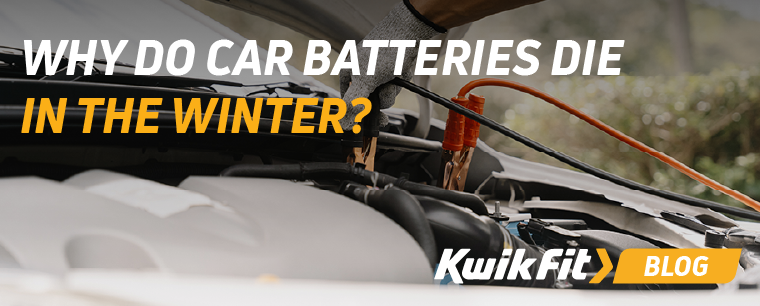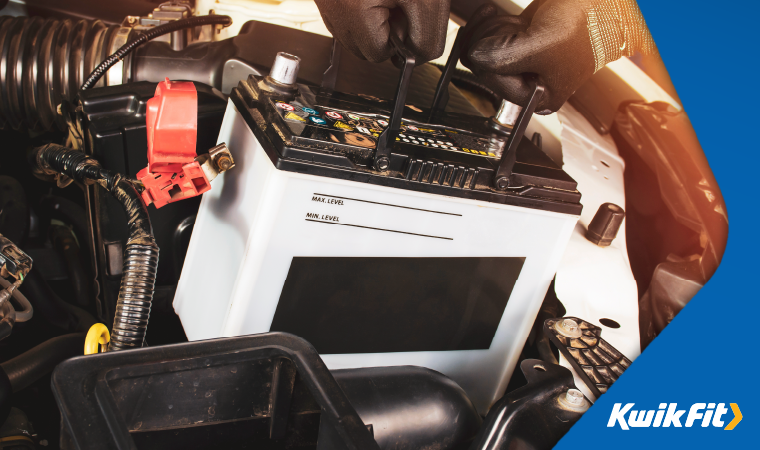Why car batteries die in cold weather
| Tuesday 21st January 2025 9:10am

If you’ve ever experienced that sinking feeling of turning your key in the ignition only for nothing to happen, you won’t be surprised to learn that flat batteries are one of the top reason for car breakdown calls in the UK - and this problem is particularly common when cold weather strikes.
Your car battery is often overlooked but it’s at the heart of all your vehicle’s electrical systems and the only source of power to get your car started. But have you ever wondered why your car sometimes seems more reluctant to start on cold days?
In this blog, we look at why falling temperatures impact on your vehicle’s battery and the steps you can take to ensure you’re not caught out this chilly season.
How to tell if you have a flat battery
Before we explain why the cold makes car batteries more likely to die, let’s cover how to tell if your battery has gone flat or not.
If you don’t hear anything when you turn the ignition key, or you notice a faint whining noise but the starter motor doesn’t kick in, the chances are you have a flat battery. There are other warning signs too. For example, the ignition lights on your dashboard may not come on, or you might not be able to unlock your vehicle via remote central locking.
It’s important to be aware that there are other problems that cause similar effects, such as a faulty alternator or starter motor. If you have a relatively new battery and it keeps going flat, the alternator is probably to blame. Flickering dashboard lights also point to this issue. Meanwhile, a sign that your starter motor has gone is a clicking sound when you turn the key in the ignition.
If you’re not sure what’s causing the problem, you’ll need to arrange to have your car checkedover by a technician.
The effect of cold weather on your car battery
Why do car batteries struggle when it gets cold? The majority of car batteries hold their charge using a liquid electrolyte solution - and this solution is affected by temperature.
Although it takes extremely low temperatures to cause the battery to freeze, cold conditions can reduce the electrolyte solution’s ability to transfer full power. This is why you’re more likely to have trouble starting your car when temperatures tumble.
The way you use your car during cold weather can also impact on the battery. For example, because of the bad weather and shorter days, people tend to use their lights more at this time of year, for driving in the dark, as well as other systems that drain power such as heaters and windscreen wipers and washers - all of which puts added strain on your vehicle’s battery.
Cars also tend to be used less during spells of icy weather and over the Christmas holiday period when many people are off work. Because batteries gradually lose their charge when they’re not being used, lack of use can make them more prone to fail.
What can cause batteries to 'die' in the cold?
Alongside losing power, the following things are all possible causes of a flat car battery in cold weather — either combined or in isolation:
Reduced capacity
Looking at your battery’s vital statistics helps you get a great idea of how it will perform in the cold. The number of CCAs a battery has (Cold Cranking Amps) gives you an indication of just how many amperes it can produce when cold. The larger the number, the better it can perform in the winter.
Increased starter motor draw
If the weather is particularly cold, sometimes the starter motor will demand more power than usual to start. This is because in cold weather, engine oil gets thicker and the engine becomes harder to turn over. If this is the case, and your battery is also cold, the car might not start.
Increased accessories draw
As we mentioned above, when driving in icy, dark, cold, and wet conditions, chances are you’ll use your accessories more — that is lights, wipers, and heaters. Since summer has longer days, less rain, and warmer temperatures, you end up using your lights, wipers, and heaters less, meaning your battery retains its charge more effectively.
What’s more, the growth of in-car technology such as satellite navigation systems and other electronic gadgetry are placing greater strain on your car’s battery and charging system, which can lead to premature battery failure.

What else can cause your car battery to 'die'?
There are also numerous other more general factors that come into play and can cause your battery to go flat in the cooler months:
- If your vehicle has not been used for a long time, the battery may have naturally lost its charge over time.
- Something may have been left switched on, such as the headlights or a car alarm, which has drained the battery.
- If you only use your car for very short journeys, your battery likely never receives a full charge. This will shorten the life of your battery and reduce its ability to hold charge.
- Your vehicle has a faulty component which is still drawing power from the battery even when the engine is turned off. Alternatively, your battery charging system may have developed a fault.
- Your alternator may be faulty and need replacing. The alternator is the component responsible for charging your car battery when the engine is running.
- Your battery terminals may have come loose or have a build-up of dirt preventing a clean connection.
- Lastly, if your battery keeps going flat it may simply mean that it has reached the end of its life and needs replacing for a new car battery. A standard car battery will last an average of five years.
How to fix a flat car battery
Flat batteries always seem to happen at the worst possible times. If you’re in a rush to get somewhere and you discover that your car’s not cooperating, you may be able to jump start it. However, to do this you’ll need access to another vehicle and some jump cables.
Learn how to jump start your car in our blog, ‘How to Jump-start Your Car With & Without Jump Leads’
For a more long-term solution if your battery is old or damaged, you may benefit from investing in a new one. At Kwik Fit, offer a full car battery replacement service. You can purchase a battery online and book an appointment to have it fitted at your local Kwik Fit centre.
Heading 2 with Paragraph
To prevent your battery from dying during a cold snap, there are plenty of steps you can take as a precaution. For example, if you have access to a garage, make sure you park your vehicle in it to shield it from the weather.
1. Regular checks
If your battery is over three years old, it is wise to get it checked regularly as they weaken with age. If your battery is not holding a charge for as long as it used to, that is a tell-tale sign that you need to replace it soon. Don’t leave it until your car starts to fail, book in for a free battery health check with Kwik Fit today.
2. Park your vehicle inside
If you have access to an indoor parking space like a garage, park your car in there when it is not in use to reduce its exposure to the cold. You might also want to consider buying a car cover if you can’t avoid on-street parking.
3. Regular charging
If you use your vehicle for a lot of short trips, it is advised that you charge your battery at least once a week when it is really cold — especially if it is older than 3 years.
4. Turn off power drains
When parking, double-check that you have switched off anything that might drain your battery when stationary, such as wipers, lights (interior and boot), the radio, and the heater. As an added tip, try to avoid using the heater when you don’t need it as it also drains fuel too!
5. Invest in a battery booster
In case the worst should happen and you do get a flat, you may want to consider investing in a car battery booster. This is a rechargeable device that you can clip onto your battery to get it working again. This handy piece of kit doesn’t require you to use jump leads and it works more quickly than a conventional car battery charger.
Maintain your battery's health with Kwik Fit
By understanding why your battery is more likely to fail in the cold and taking steps to prevent this, you should be able to avoid getting an inconvenient flat.
If you’re concerned about the charging capability of your vehicle’s battery, don’t leave it until your car doesn’t start. Call into your nearest Kwik Fit centre instead and our experts will carry out a free check of your battery starting and charging systems using the latest Bosch testing equipment.
We’ll check your battery’s performance against the manufacturer’s specification and let you know of any issues and inform you of any parts that need replacing now or in the near future.
Looking to replace your battery? View our range of car batteries and buy online.
Any facts, figures and prices shown in our blog articles are correct at time of publication.
Featured Articles
Is it Illegal to Drive With One Headlight?
Saturday 19th July 2025
Wondering if it’s illegal to drive with one headlight? Learn about the safety risks and penalties of illegal blown bulbs and why you should fix them promptly.
Air Con in EVs & Hybrids: Experts Answer Your Questions
Monday 30th June 2025
Does air con drain EV batteries? Can you use the air con while charging an electric car? Find out the answers to these questions & more from Kwik Fit’s experts.
Why Is Your Car Making a Noise? Fixes & Tips
Friday 13th June 2025
When your car starts making unexpected noises, it can certainly be quite disconcerting; it may be nothing to worry about, but here’s what you need to know.









